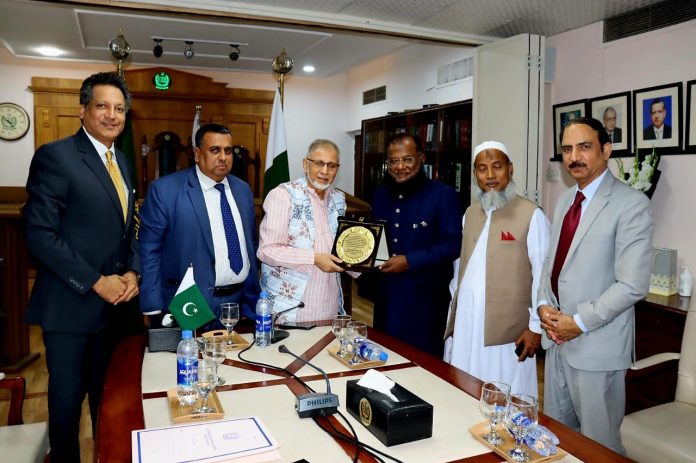- Advertisement -
ISLAMABAD, Oct 29 (APP):A delegation of Bangladesh has visited the Federal Tax Ombudsman (FTO) Secretariat to study Pakistan’s Ombudsman model and explore avenues of cooperation in establishing a similar institution in Bangladesh.
The visit marked an important milestone in strengthening regional collaboration on governance, accountability, and taxpayer facilitation, a news release said on Wednesday.
Upon arrival, the delegation was received by Federal Tax Ombudsman Dr Asif Mahmood Jah along with FTO Registrar Khalid Javed, and Advisor (Legal) to the FTO and Executive Secretary OIC Ombudsman Association (OICOA) Almas Ali Jovindah,
The visiting delegation included Bangladesh’s State Minister for Finance (Special Assistant) Dr Anisuzzaman Chowdhury and High Commissioner of Bangladesh to Pakistan Iqbal Hussain Khan,
Dr Asif highlighted the pivotal role of the FTO in promoting taxpayer confidence and ensuring administrative justice in Pakistan.
He outlined the FTO’s achievements, emphasizing its contribution to transparency, fair taxation, and citizen facilitation.
He stated that the FTO has facilitated recoveries exceeding Rs 23 billion for taxpayers, with most complaints resolved within 34 days, reflecting efficiency and credibility.
Jovindah delivered a detailed presentation on the evolution, jurisdiction, and operational framework of the Ombudsman system, explaining that access to justice has increasingly become a privilege, and that Ombudsman remains a blessing for citizens seeking cost-free, swift, and impartial redress.
The FTO briefed the delegation on the historical foundations of the Ombudsman institution, tracing its roots to the era of Hazrat Umar (RA), when public officials were held accountable to the people.
The concept was later refined during the Ottoman Empire, institutionalized in Sweden, and endorsed through a United Nations resolution in 2014, which led to the establishment of Ombudsman offices in more than 140 countries.
He elaborated on the FTO Ordinance 2000, including Section 2, which defined its jurisdiction, and Section 9(1), which authorizes complaints to be filed by any person, by reference, or on the Ombudsman’s own motion.
He also explained the bar to jurisdiction covering sub judice, assessment, anonymous, or time-barred matters, ensuring legal precision and procedural transparency.
Dr Asif highlighted the FTO’s complaint registration and adjudication process, under which cases are promptly assigned to Advisors, the Federal Board of Revenue (FBR) must respond within 15 days, and findings are finalized within 34 days.
The Implementation Wing ensures compliance within 45 days, while cases of defiance invite disciplinary action or imprisonment of up to six months.
He further elaborated on Section 33 of the Ordinance, which empowers the FTO to conduct Informal Dispute Resolution (IDR) through mediation, a process that significantly reduces litigation time and cost.
He emphasized that the FTO is the only Ombudsman institution in Pakistan led and staffed by experts with taxation backgrounds, enabling sector-specific expertise and timely adjudication.
He added that several countries send their officers to the FTO Secretariat to learn from Pakistan’s experience, as the FTO has achieved in 25 years what others continue to strive for.
Dr Anisuzzama admired Pakistan’s citizen-centric Ombudsman model, describing it as a benchmark of integrity, transparency, and effective public service.
He commended the leadership of Dr Asif for transforming the FTO into a credible, reform-oriented institution and expressed keen interest in future collaboration with the FTO Secretariat to develop a similar mechanism in Bangladesh, underscoring the importance of institutional partnerships and knowledge sharing.
As a gesture of goodwill, Dr Anisuzzaman presented a token of appreciation to Dr Asif, who reciprocated with a souvenir to commemorate the visit.
The event concluded with a tree-planting ceremony led by Dr Anisuzzaman at the FTO Secretariat, symbolizing friendship, growth, and enduring cooperation between Pakistan and Bangladesh.

